Iphigenia is an abandoned child, almost murdered by her father, lost in bewilderment, captured and indoctrinated in an artificial existence. It hardly matters that her father was the legendary Greek hero Agamemnon, her mother the notorious Clytemnestra. Spare in story as they are, classical myths contain overwhelmingly strong capsules of emotion. It’s because Pina Bausch was so acute at extracting for dance-theatre the most piercing emotions that I find myself hostile to the frigidity of her dance-opera Iphigenie auf Tauris.
Showing at Sadler’s Wells this week, Iphigenie - created a quarter-century ago in 1974 - may be the last many of us see of Bausch's company now that the first lady of dance-theatre is dead. Sadly coterminous with the Cunningham company’s farewell tour in London this week, Tanztheater Wuppertal Pina Bausch is on a three-year posthumous tour programme, and it remains to be seen how it moves on.
When fashioning dance from basic instincts, finding music to follow those instincts, spraying them with memories and autobiographical enigmas drawn from herself or from her dancers, attaching ambitious design values, wrapping and gradually polishing and finessing the package into one of her inimitable and entirely original creations, Bausch was simply superlative. But while I can’t find a flaw in the attention to detail and high style in her presentation of Gluck’s opera, she takes a tightly miserabilist line against music that is vastly richer than that. It is a kind of butoh, distilled only to mourning, gorgeous but insistently empty.
True, Iphigenie is in a hell of a position. Her dad was ready to kill her in order to obtain a fair wind for his warships. She was whisked away by merciful gods and stuck on a rock to grow up as a lonely priestess, where (rather akin to the Wilis in the ballet Giselle) she and her girls are under orders to sacrifice to the gods any men who turn up.
Meanwhile, her mother has turned on her father and murdered him, leaving her brother Orestes (who hardly knows his lost sister) in his own trauma, reluctantly doing in his mother. Orestes is wrecked on Iphigenia’s island and a third death in the family is due to be carried out by unwitting sister on brother. At the moment of sacrifice, her mind clears and she recognises him. The goddess Diana ratifies the happy ending.
The irony is that Gluck out-Bausched Bausch in his treatment of this story. The opera’s internal qualities make it almost a cantata, a psychological storm of reflections and questions; when Iphigenia remembers the events of her past, there is an episodic, fragmentary rush to them in the music that heightens the feeling of her lostness, the patches in her existence, the scars she bears. While this magnetic psychodrama pours down from the high boxes either side of the theatre where the singers are, on stage Bausch presents Iphigenia as a girl practically catatonic with misery, writhing between huge white sheets on a washing line.
I agree that the image perfectly evokes an all-enveloping blankness, associations of eternal nightmare sleep. It was created by Rolf Borzik, Bausch’s lover and collaborator, whose ravishingly minimal designs are the most extraordinary feature of the staging. (Iphigenia’s appearance echoes Bausch’s own appearance in Café Müller, also a lost girl.) It’s where it goes from there - from blank to nowhere - that I have the problem with.
Girls in shifts, boys in underpants, everything cleaned up, stripped down, spaced out. It is frigidly self-conscious
In Gluck’s opera, these appalling family events are related by Iphigenia and Orestes partly as memories, partly as bids for information, parsed through the ebb and flow of feelings that govern the feelings of the teller - Iphigenia’s first utterance in the opera is a spine-chilling cry to the gods, half exhortation, half shriek. The mesmerising singing by Danielle Halbwachs, the conducting of the first-rate little orchestra by Jan Michael Horstmann, are marvellously awake, alert, conscious.
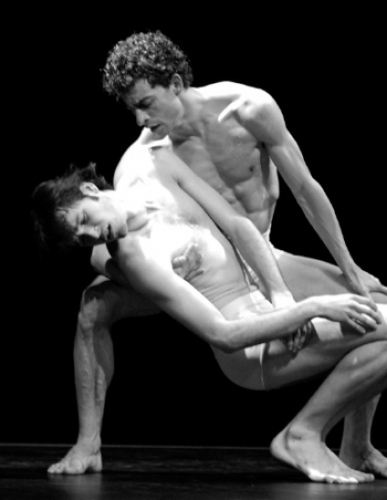 These ambiguities and subtleties constantly blow changes through the music. But the dance, if you know nothing of what the text is saying, has the stasis of a governing depressiveness, girls in shifts, boys in underpants, everything cleaned up, stripped down, spaced out. Without surtitles, the story so urgently dramatised by the singers is smoothed into an oppressively self-conscious blandness, an unvarying heavy flow: the treacly wrestling of the lads, Orestes and Pylades (pictured right, Pablo Aran Gimeno, Fernando Suels Mendoza, photographed by Ulli Weiss), counterpointing the elegaic all-girl atmosphere of the rest, Iphigenia and her virginal companions. The iconic murder of Agamemnon is briefly represented with a bath and semaphore from Clytemnestra and Elektra; factual gestures, when in the opera the singers are only telling half-facts.
These ambiguities and subtleties constantly blow changes through the music. But the dance, if you know nothing of what the text is saying, has the stasis of a governing depressiveness, girls in shifts, boys in underpants, everything cleaned up, stripped down, spaced out. Without surtitles, the story so urgently dramatised by the singers is smoothed into an oppressively self-conscious blandness, an unvarying heavy flow: the treacly wrestling of the lads, Orestes and Pylades (pictured right, Pablo Aran Gimeno, Fernando Suels Mendoza, photographed by Ulli Weiss), counterpointing the elegaic all-girl atmosphere of the rest, Iphigenia and her virginal companions. The iconic murder of Agamemnon is briefly represented with a bath and semaphore from Clytemnestra and Elektra; factual gestures, when in the opera the singers are only telling half-facts.
It is irreproachably performed - dark, pliable Ruth Amarante as Iphigenie has all the traumatised yearning one could wish for (and more). There are breathtaking bits of staging: a scene where the two men trespass on the girls beside a large rectangular pool, and the climax of ritual sacrifice, a blindingly white bath, a table formally decked with white flowers (in a gorgeous Bauschian sequence), and the victim laying himself docilely backward across a table, neck stretched for Iphigenia’s knife.
This is unmissable, in purely professional terms, because there are so very few creators who can provide such triple-strength emotion with such exquisitely calculated chic. But to me it rings false, style prioritised over truth.
- Tanztheater Wuppertal Pina Bausch performs Iphigenie auf Tauris at Sadler's Wells, London until Sunday (returns only)
- See what's on at Sadler's Wells in 2010-11
- Read theartsdesk's long Q&A with Pina Bausch
- Find John Eliot Gardiner's 1986 recording of Gluck's Iphigenie en Tauride with Diana Montague and Thomas Allen
 Listen as Iphigenie and Orestes recognise each other in time
Listen as Iphigenie and Orestes recognise each other in time

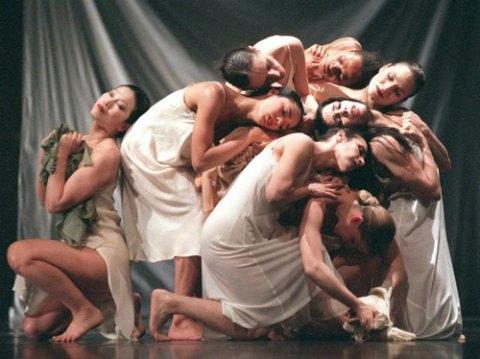



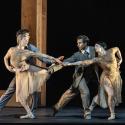
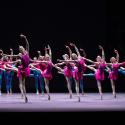

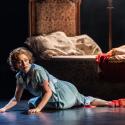





Add comment